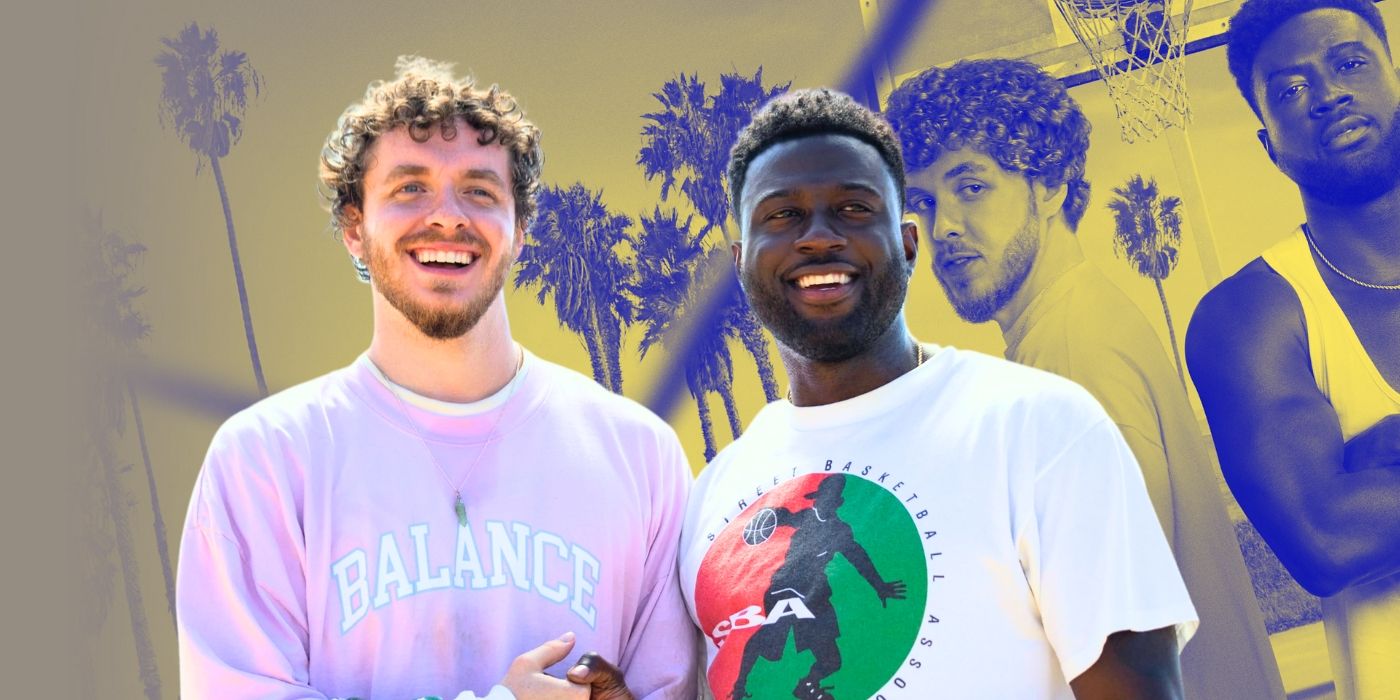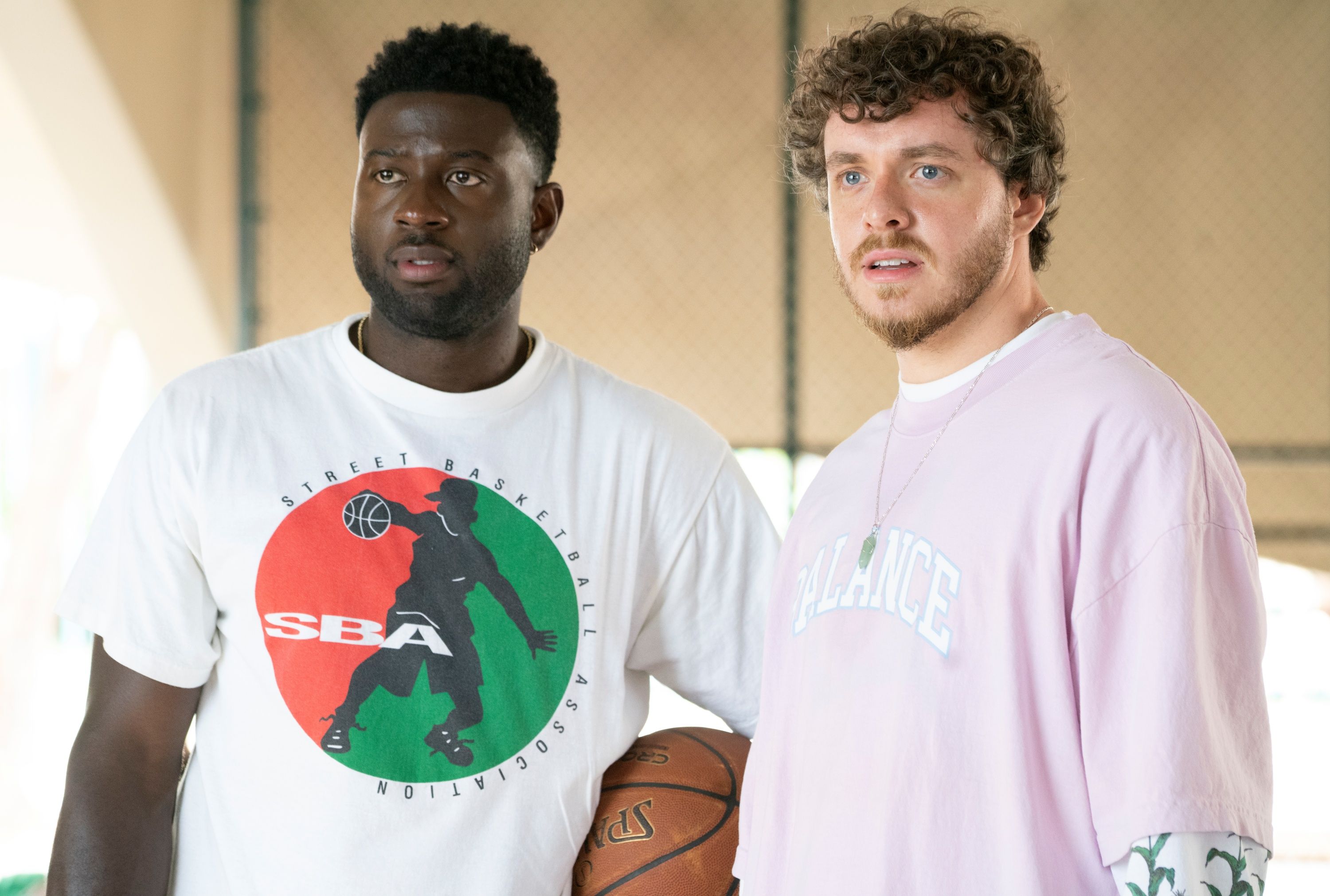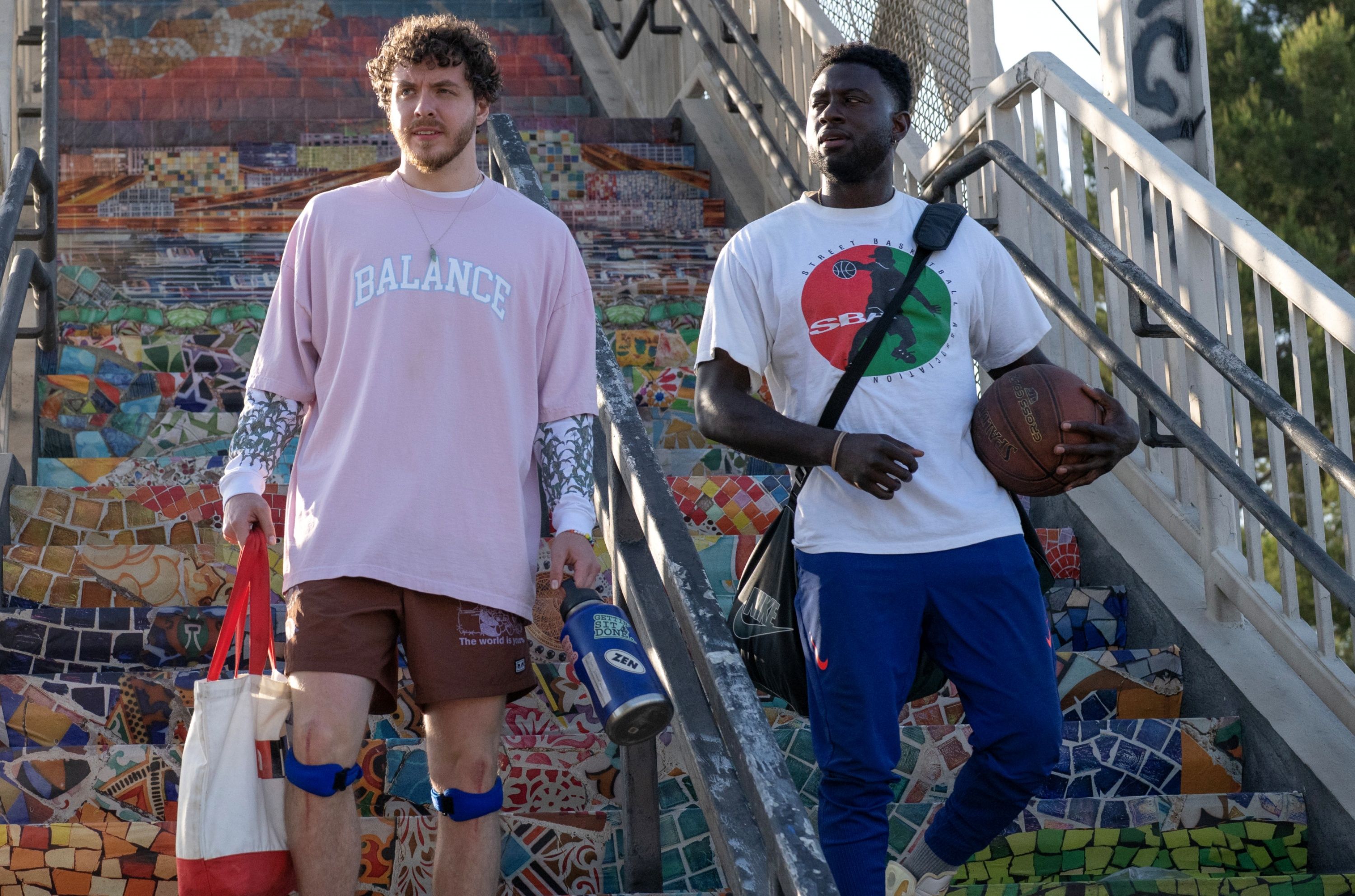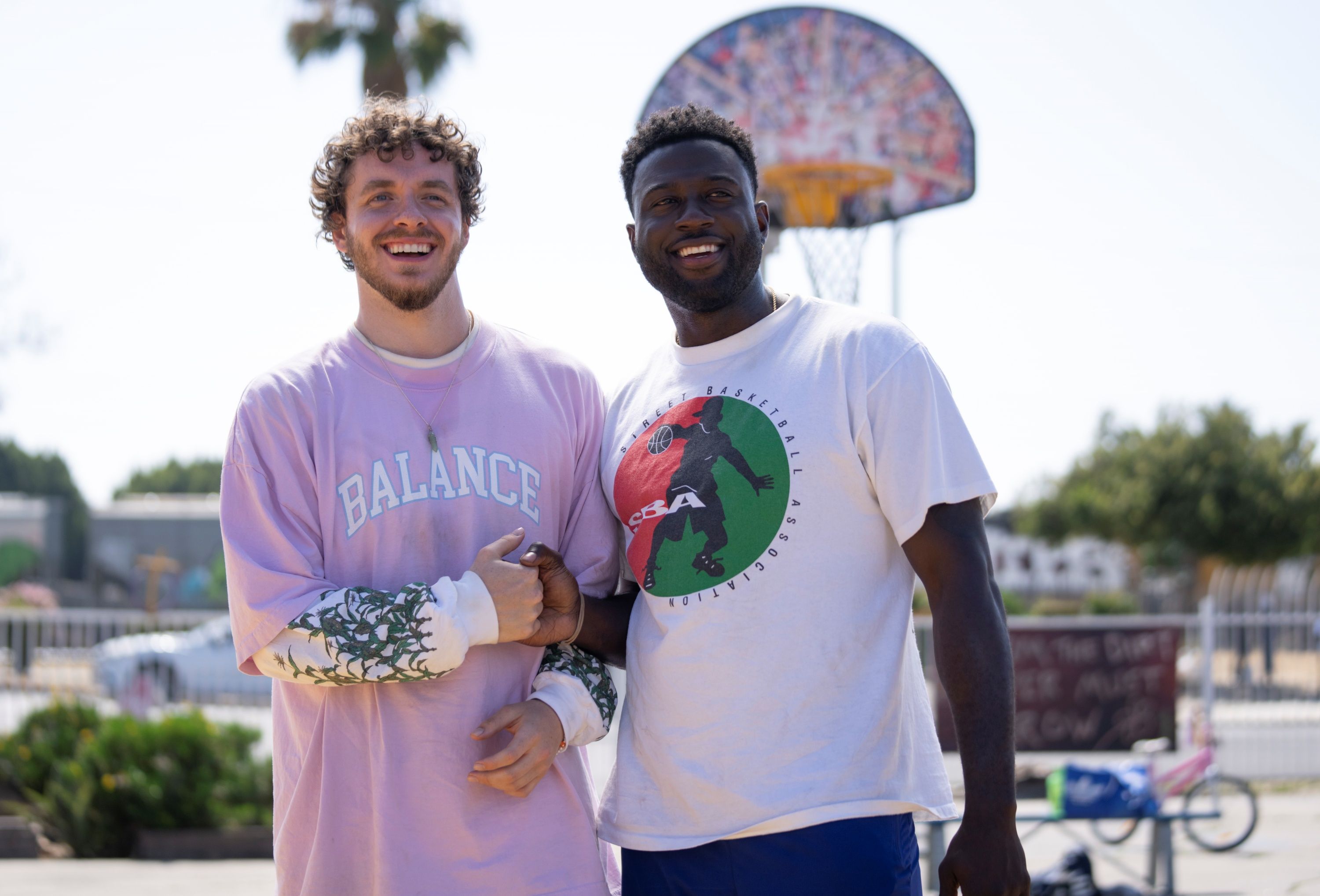Director Calmatic’s take on White Men Can’t Jump follows Jeremy (Jack Harlow), a former basketball star whose injuries have kept him from playing at the level he dreamed of, and Kamal (Sinqua Walls), a promising player who knows what it’s like to have life turn out different than you expect. When the two meet and realize that they might very well be the answer to their financial struggles and life pressures, they decide to team up on the court, where they can also bond over their mutual love of the game.
During this press conference to promote the remixed take on the 1992 film, co-stars Harlow and Walls talked about making the basketball scenes authentic, their approach to shooting Los Angeles, the learning experience this was as Harlow’s first acting role, how their on screen and off screen friendship grew, working with their late co-star Lance Reddick, highlighting Kamal’s mental health journey, and what brought Harlow the most joy on this shoot.
Question: Sinqua, you came to this with a basketball background, having played in college. What was it like to take on Kamal and be able to add a little of that basketball knowledge?
SINQUA WALLS: Honestly, the most important thing was to make sure that this was authentic with basketball. That’s something that we truly really cared about. A lot of the movie moves at a pace where we had to do single takes, and those movements don’t work unless someone can authentically play basketball to a level that makes the most sense. That’s why the basketball in it is so good. We’re all gonna be critical of it, so it was important to make sure that was infused naturally. And it was just fun to step in and use things that I’d already done for years. I had been playing ball since I was six years old. So, it was something that can actually happen naturally and just move in that space.
What did you think of the original film?
WALLS: The best part was the way that we shot L.A. and the intricacies of that. The ‘92 movie did something really great with Venice and street ball and telling that authentic story, but one of the special things, genuinely, is the fact that Calmatic can shoot L.A. better than anybody else. He knew spaces for us to unpack. That’s what really updates it for now. You see parts of L.A. that you didn’t see in the original, but you see the people and the culture and the color and the vibrance and the essence. If you grew up in L.A., you know somebody from Watts and how they really move, from Compton and how they really move, from Gardena and how they really move, from Crenshaw and how they really move, and all those places. That really is different, this time around. The city is its own character that lives in the story.
Jack, with this being your first movie role, what was it like to walk on set and be a leading man?
JACK HARLOW: It was a cool learning experience. I’m thankful that I joined a group of people that were so humble and willing to let me learn, and who were patient with me and willing to teach. I arrived into an egoless environment, and I was the least experienced person, but everyone just let me shine and try things, and gave me the room to give my opinion. I’ve gotta give a big shout-out to Cal for that. If I felt strongly about something, it didn’t mean that it was gonna go that way, but Cal would hear me out, and vice versa, of course. I was all for the lead vision, but I appreciated that I could come into my first one and people actually cared what I thought. I just wanna give a big shout-out to everybody that was involved in the film, for making my first one such a seamless experience.
This movie is about a journey, but it’s also about friendship, and it’s beautiful to see Jeremy and Kamal grow together, as characters. What was your favorite moment, in bringing that friendship to life?
WALLS: It moved in sequence with the movie. One of my favorite days was the first day that Jack and I were together. We played and really got into the trenches with each other, and really got a chance to know each other and listen to each other. We let each other be each other, and that’s just a testament to life, in general. I think people are responding to the chemistry that we have, or the friendship that we have, because we generally just let each other, as Jack and Sinqua, be Jack and Sinqua. We didn’t try to force or try to infuse. We just let each other come to each other naturally. And then, you see the progression over the film and how, by the end, we had inside jokes. Jack would say something and I would pick up on it. I’d be laughing, but still trying to stay in character. You see that happen naturally, from the beginning of the film. And then, when we were at Leimert Park, that was one of the best moments in the film.
HARLOW: Yeah, I agree. I know this is my first one, but I can’t imagine that there are many experiences you can have with someone else where you can create this sort of thing. It’s unforgettable. Whether we ever do another movie together again or whatever, wherever this leads, we always have this. We had that month and a half, or two months, together where we were just interacting, on and off camera, and really got to know each other and feel each other out. I agree, the first day was definitely a feeling out process. The very first scene we shot, it was almost weird. We were just feeling each other out, on that first take, and it low-key got real. We were just like, “Who is this guy?” But after that, it was really smooth.
WALLS: One of the things that really meant a lot to me was that he called me, two days before the first scene. He was like, “Bro, let’s just go over the lines because I don’t want the first time that we work together to just be the first time we actually speak.” I think that speaks volumes. Even though it was his first one, he was really professional and really seasoned. He just called me to do that. I’ve worked in this business for a while and had a lot of castmates and people that I’ve worked with, and I can honestly count on my hand, the people that have called me, and he’s one of them.
What was it like to work with Lance Reddick on this?
WALLS: He was super generous. In one of the hospital scenes, he had to eat some Jell-O. He was supposed to be in the chair, in his moment, going through his illness, and he accidentally hit the wrong Jell-O. I remember him breaking character and being like, “My bad, man. Let’s just go ahead and take that back.” It was so funny because he laughed too. And then, he went right back into character. I was, like, “That’s a pro, right there. That’s legacy.” He was really well-trained. He was really well-studied. To see him break character, laugh, and then go right back into it, was just a testament to his personality.
HARLOW: I had one or two days with Lance, but I was really taken by his presence. The energy he had playing Benji, just felt so real. When I think back, it’s hard for me to separate in between takes from what was going on, on camera. He just had a warmth that the character he was portraying had. He was kind as hell. It’s as simple as that. That’s how I’ll remember him.
There’s a heavy emphasis on mental health within this film. Why was that such an important thing to include in this story, especially with Kamal’s journey and what happens with him?
WALLS: It was really important because it’s current to today. We’re seeing so many different things that people are afflicted with and struggling with, and they’re trying to overcome. What the ‘92 film did was really be elemental of what was going on in the culture, and now our culture has progressed to a place where mental health is so important and people are wanting to have that conversation. They’re wanting to have a conversation of, “How can I get help?,” or “How can I help?” Love is being present, but also holding someone accountable. That’s what Jeremy did for Kamal when he identifies something. We have this line in the film where Jeremy says, “Basketball is your therapy,” to Kamal. I know so many people who don’t know their thing, which can be their therapeutic tool for growth and ability to have peace. And so, I think it was really important to infuse that. We wanted to make sure we had those moments and that the story had that impact. As people get more comfortable with their own mental journey, they’re allowed to open themselves up and be open to so many other paths of their journey with people. That’s what Jeremy and Kamal go through.
Jack, what brought you the most joy while you were making this?
HARLOW: That’s a good question. It reminded me of school because you just show up at a time that you’re told to show up, someone else is in charge, and you have no choice but to befriend everyone you’re around. It’s really quite wonderful. It’s like school or summer camp, and it’s the first time I’ve felt that since school. I had just dropped an album. I was in the whirlwind of the music industry. The way the schedule was set up, as soon as the album came out, I went out to L.A. to shoot this. It was such a beautiful escape from the place I was in. I needed it, mentally and emotionally, just to get out of the monotony of music. And it was phenomenal. Every day, I looked forward to showing up. I loved the movie we were making. I love my craft. By the end, I had a little vibe with everyone on set. I maybe had an inside joke, or we’d have chemistry. I had chemistry with everyone on that set. I had chemistry with the people at crafty. It was just fun.
White Men Can’t Jump is now streaming on Hulu.




